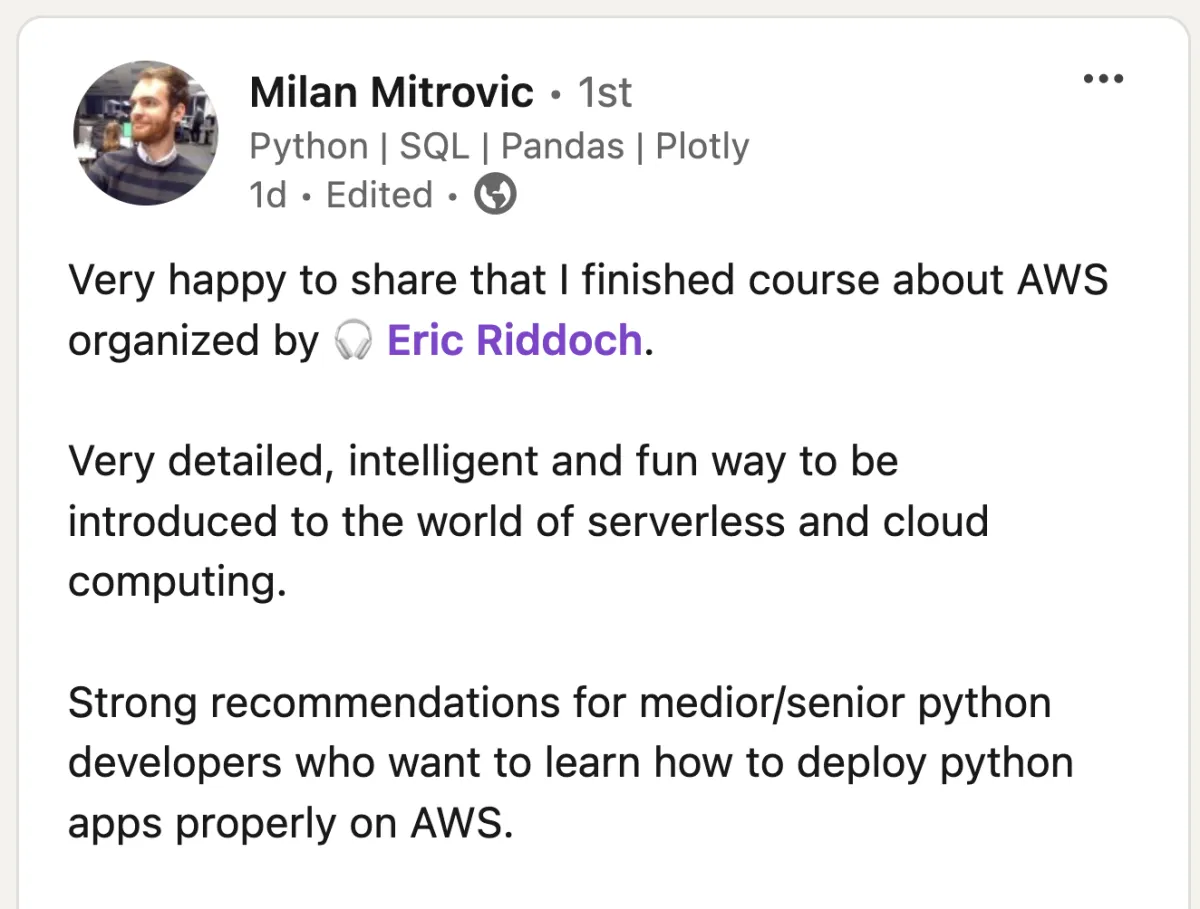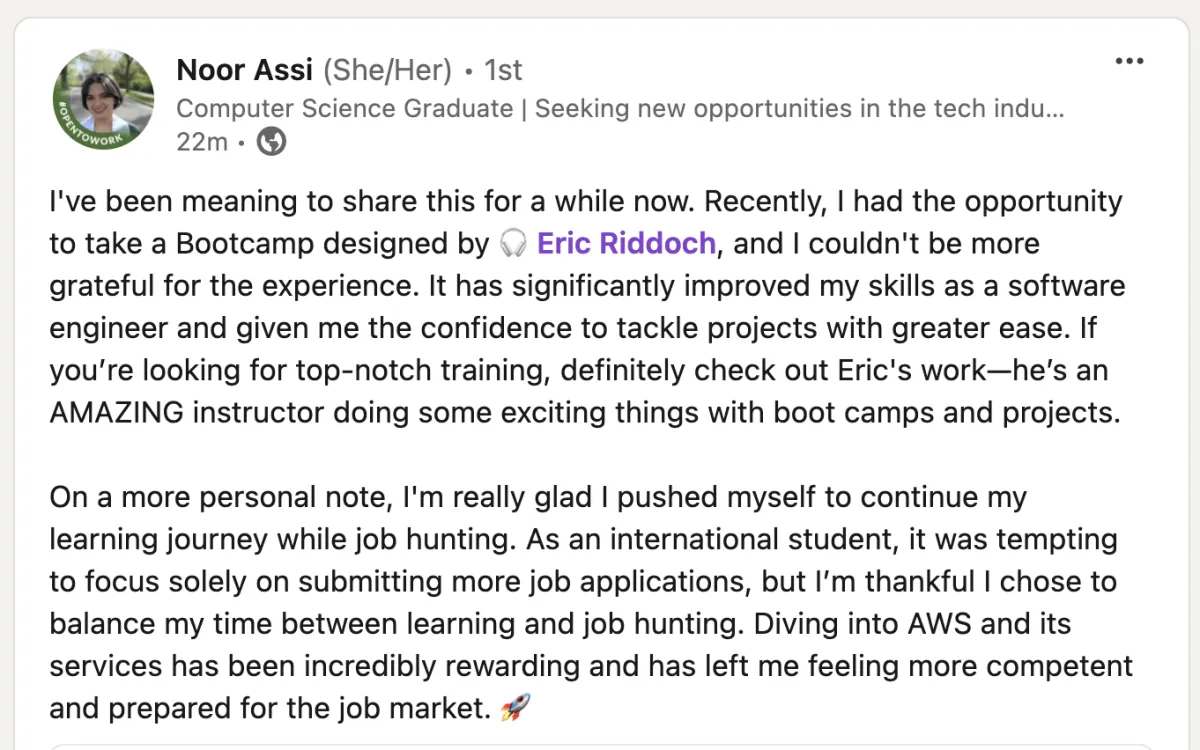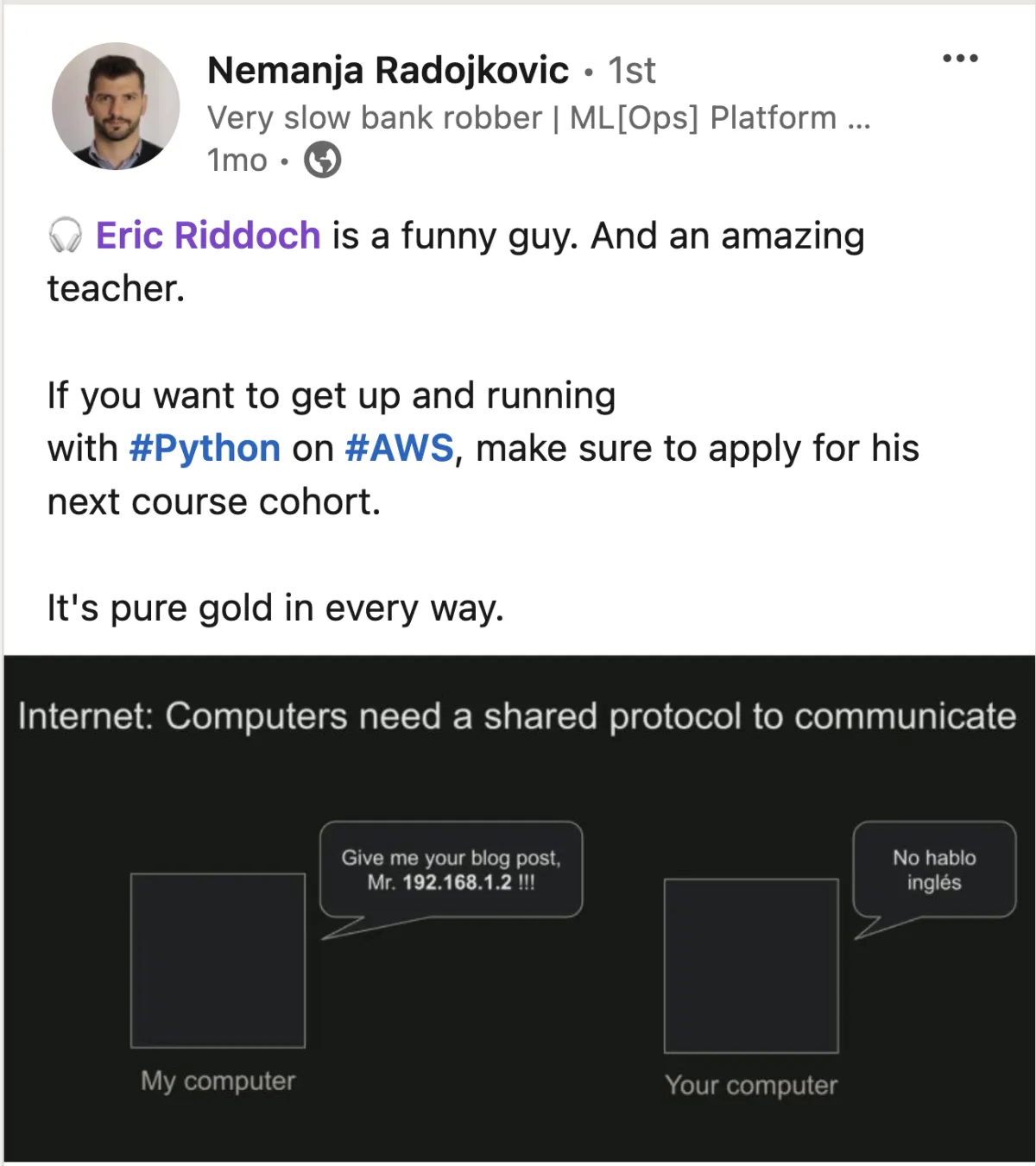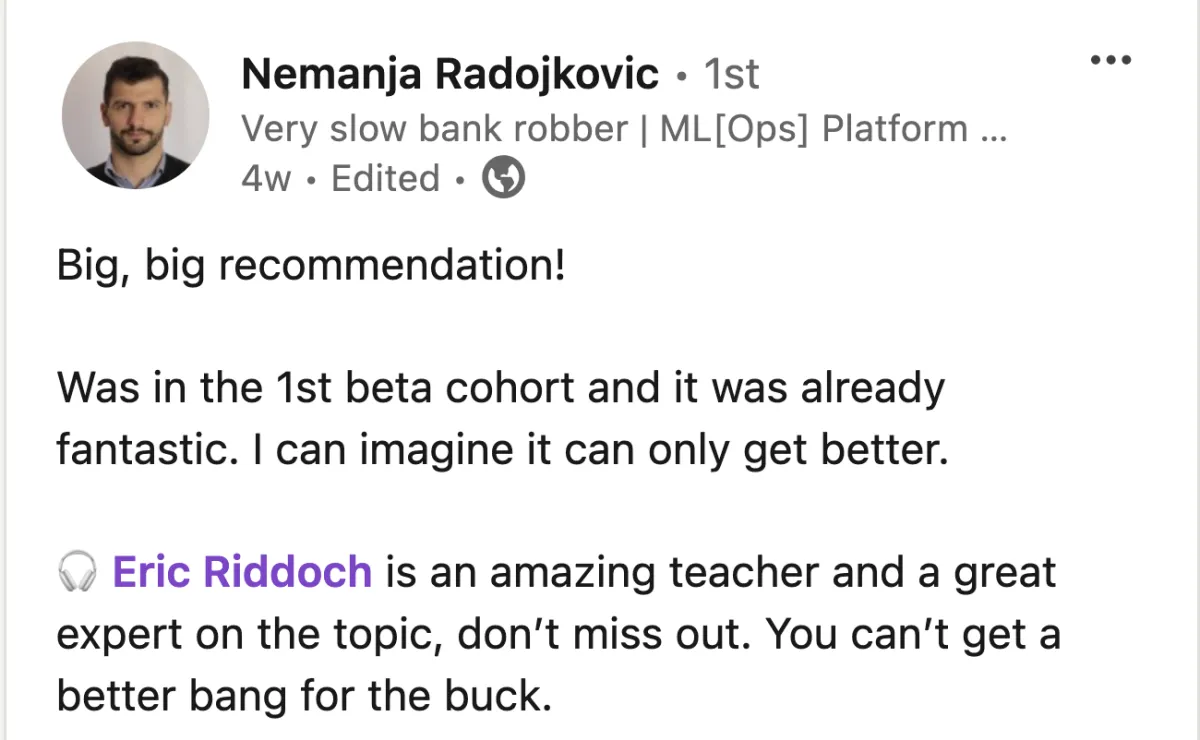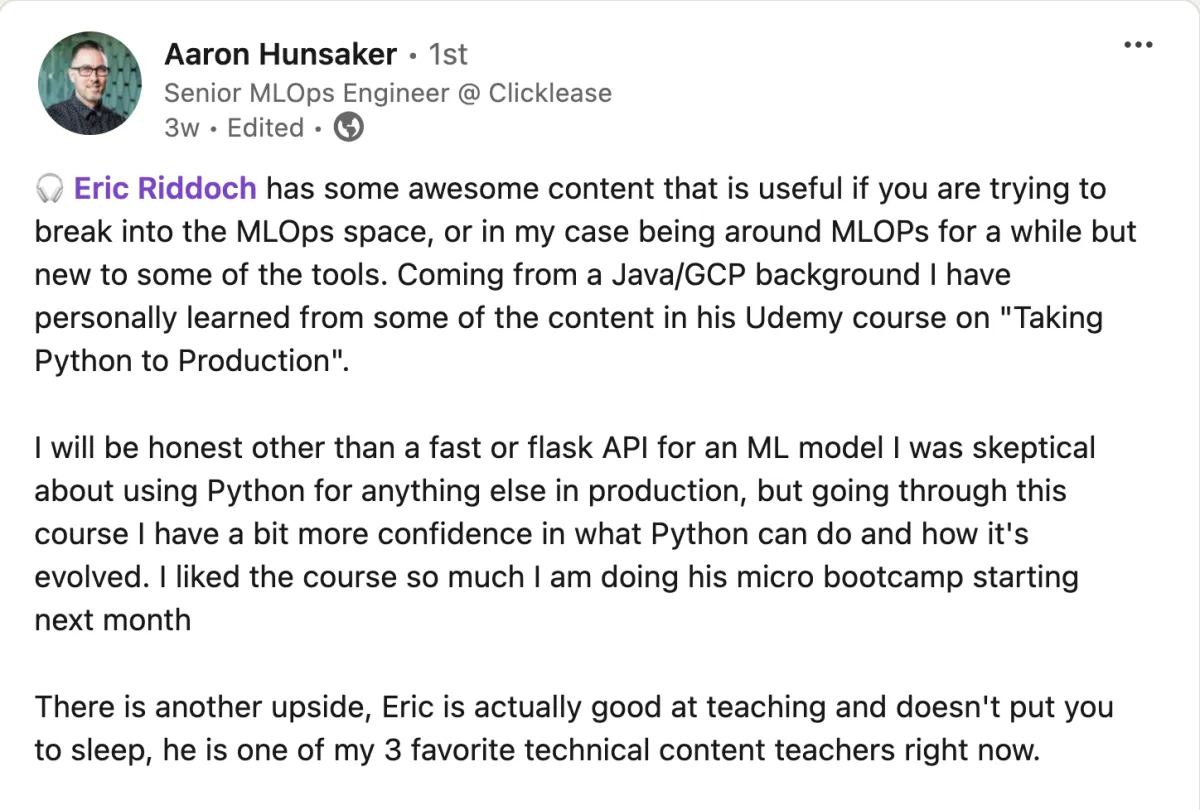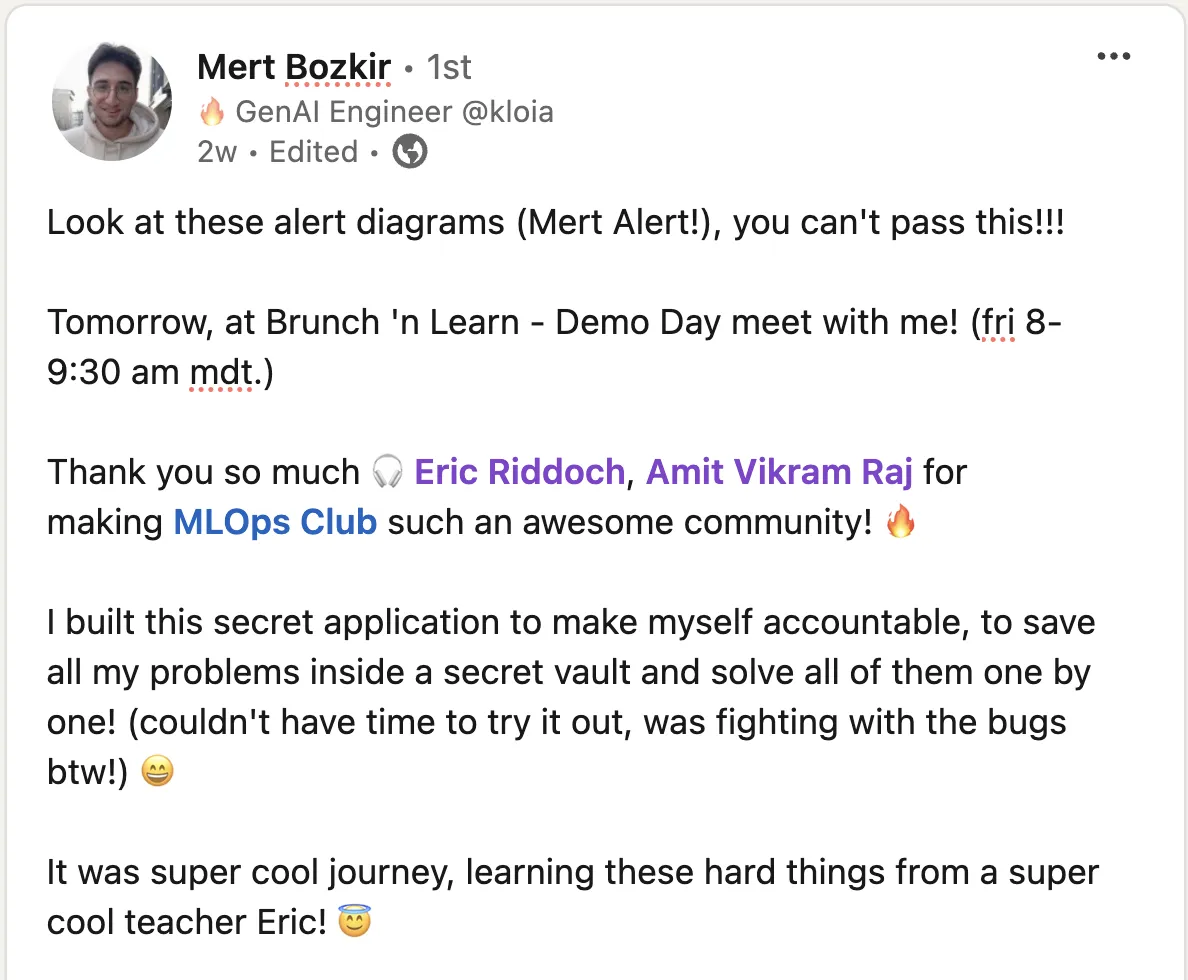Taking Python to Production on AWS
Design, develop, test, ship, and monitor applications in the cloud.
This is a hands-on course for intermediate Python developers.
Course Overview
The course includes
7 weeks of instruction
25 hours of self-paced video to complete between classes (3 sets each week)
Office hours 1x/week on Wednesdays at 9-11am MDT on Zoom
Labs for each unit
Help in Discord. NOTE: This is currently fairly slow.
Lifetime access to everything
self-paced video lessons, labs, and articles and all future improvements
the course project codebase
private Discord server with your cohort (TA's and instructors can't commit to a response SLA when a cohort isn't in session)
Certificate of completion after successfully deploying the course project and passing it off
(Optional) complete a <3-week, self-directed solo- or group project and present at a demo day with industry professionals. Past demos here.
Refund if <40% of videos watched; just message Hossam.
Note: So far, 2 students have asked for a refund. In one case, they should have applied for a scholarship--we switched them over. In the other, they didn't have the SWE background needed to keep up so it was a bad experience. We offer $100 off for doing the $13 SWE course first for a reason.
Pricing
I'm busy job searching, so for the time being, I
1.converted the course to self-paced mode only
2.reduced help in Discord (I'm slow to answer)
3. reduced the price by 75% (from $600 -> $145)
-Eric
$145
~₹13,200 INR
We send you a receipt to help you get reimbursed by your employer.
Anyone: You can get an additional $100 off tuition if you complete Taking Python to Production first. Let us know here.
Learning Outcomes
Become an intermediate cloud engineer with a foundation you can build on to learn specialized, advanced areas of AWS or other cloud providers.
AWS account management
Set up an AWS account in an advanced way to safely grant access to code and collaborators
Manage permissions with IAM, following the principle of least privileges
Calculate and manage the cost of applications on AWS
Cloud-native software design
Become comfortable with the AWS console, SDK, and CLI
Learn best practices for authoring "cloud-native" applications by writing a REST API
Become comfortable writing and testing scripts using the AWS Python SDK (boto3)
Minimize vendor lock-in
Deployment and "serverless" cloud development
Deploy the REST API to AWS using AWS Lambda and AWS API Gateway
Iterate quickly by speeding up deployments and developing locally
Advanced application observability
Track logs, metrics, and traces for the application
Set up alerts to notify you of failures and dashboards
Perform a root cause analysis to diagnose errors and identify performance bottlenecks
General cloud skills
Understand how most services in AWS are used such that you feel confident learning new services
Transferable skills: Feel comfortable exploring any cloud (Azure, GCP, CloudFlare, etc.)
AWS has rough edges. We are not paid by AWS. We are not shy about recommending alternative workflows and tools that result in less lock-in and faster iteration cycle times.
Modules
View the full syllabus here
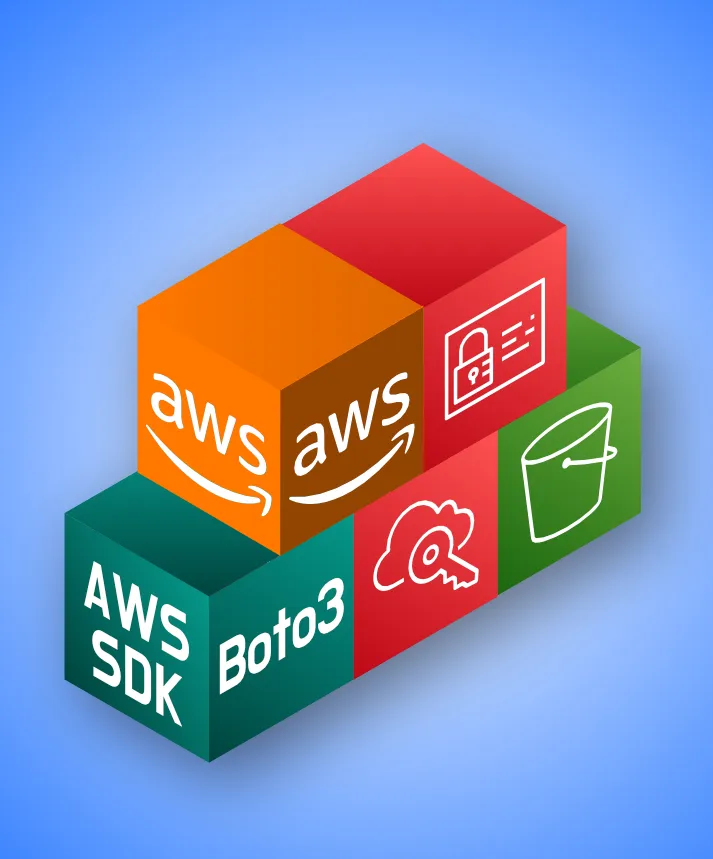
Week 1: Advanced AWS account setup. Intro to permissions and the AWS SDK
Set up your AWS account
Create an isolated AWS account just for this course
Write and test a script with the AWS SDK
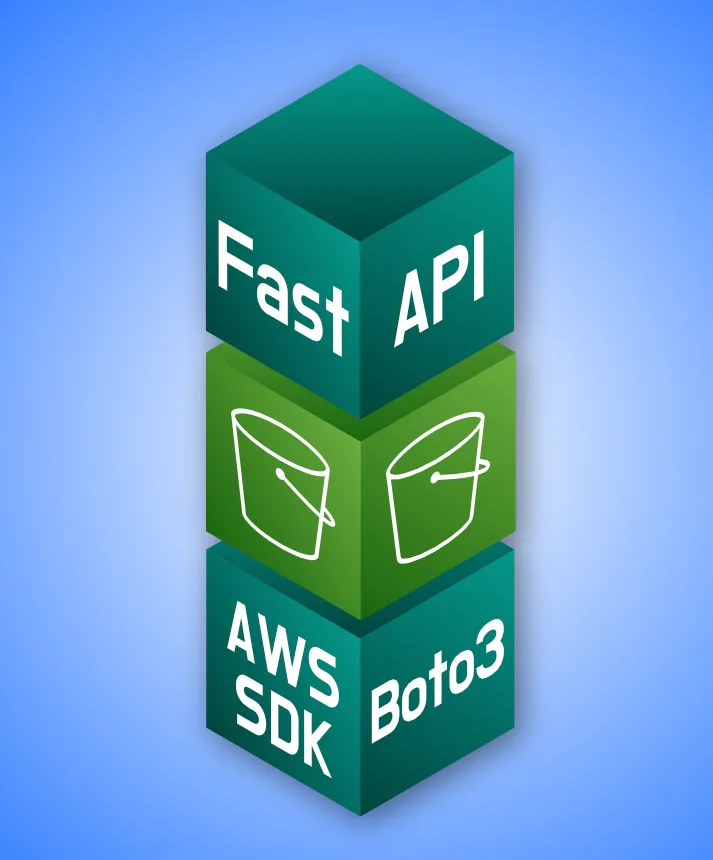
Week 2: Write a cloud-native REST API
Deep dive on REST, HTTP, and RFCs
Review FastAPI
Locally develop and test a FastAPI app that does CRUD operations on S3, making use of OpenAI's endpoints
Implement the principles of the 12-factor app and RESTful conventions
Rigorously test our API contract
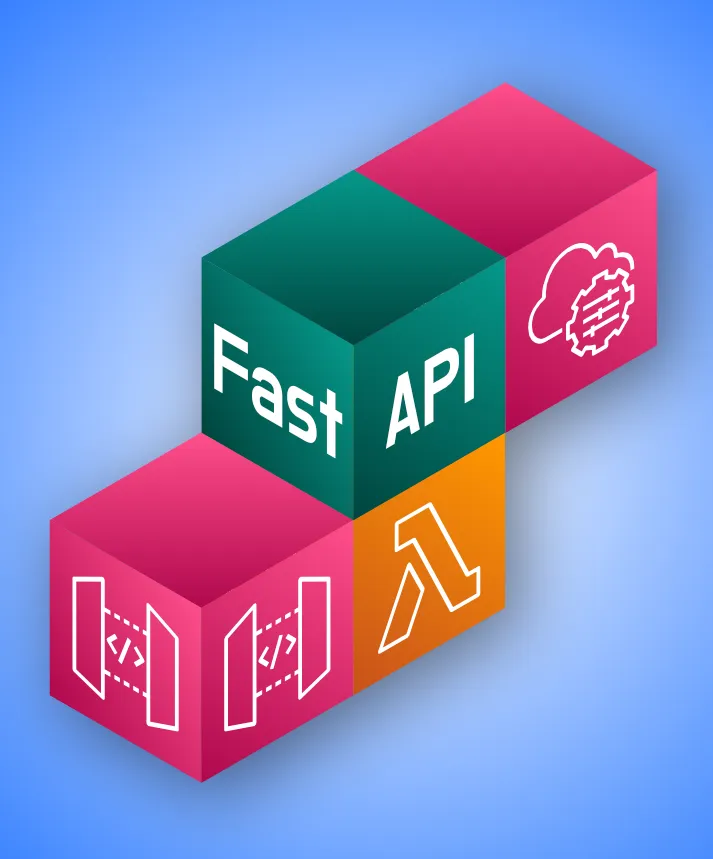
Week 3-4: Serverless deployments.
Deep dive into AWS Lambda / Serverless
Deep dive into AWS IAM under the hood to understand authentication and authorization
Deep dive into configuring API Gateway
Deploy FastAPI to Lambda and API Gateway, using docker for builds

Week 5-7: In-depth observability
(section intro video)
Capture logs, metrics, and traces from our FastAPI.
Create alerts from this data to notify when problems arise.
Set up a workflow to diagnose errors and identify performance bottlenecks.
Receive the certificate after implementing this content in your course project.

(Optional) Self-directed solo- or group project
Plan and build a project that makes use of AWS. Self organize a group or work solo. This is a chance to collaborate with motivated partners at a similar level to you and build something you personally care about.

(Optional) Final project demo
Ask us for guidance on a project. If you like, record a demo and we will give you a shoutout and feedback.
Non-outcomes
This course does not cover
Infrastructure as Code
Container orchestration
DNS and HTTPS
In-depth auth, e.g. OAuth 2.0
Advanced CI/CD
Networking on AWS
These concepts go beyond intermediate level.
We consider the contents of this course to be prerequisites for these advanced topics and hope to lead a follow-up course covering them in the future.
During office hours, questions on any topic are encouraged--including about these ^^^
Course Delivery
Office hours and Q&A over Zoom. Thursdays from 8-9 AM MDT
Homework: Complete 1-2 hours of async videos, labs, and readings before each lecture. Access to all released materials is available with in a course portal.
Chat with TAs, classmates, and instructors on Discord.
ABOUT YOUR INSTRUCTORS
Hossam Arafat
Senior AI Engineer @ Ernest & Young
4 years experience deploying ML systems
Published works in USCAP & The American Journal of Dermatopathology
Winner of Regional & International competition for Marine Robotics (MATE)
Eric Riddoch
Former Staff Engineer and ML Platform Lead @ BENlabs
7 years building on AWS (Analytics, Data Engineering, MLOps)
Best-selling Udemy instructor (course here)
Creator of ML and data engineering systems handling 2-4 million requests/day and many open-source projects
Meet Hossam
Built cutting-edge ML Platforms on AWS and presented at Netflix
Authored a bestselling, highest-rated Udemy course
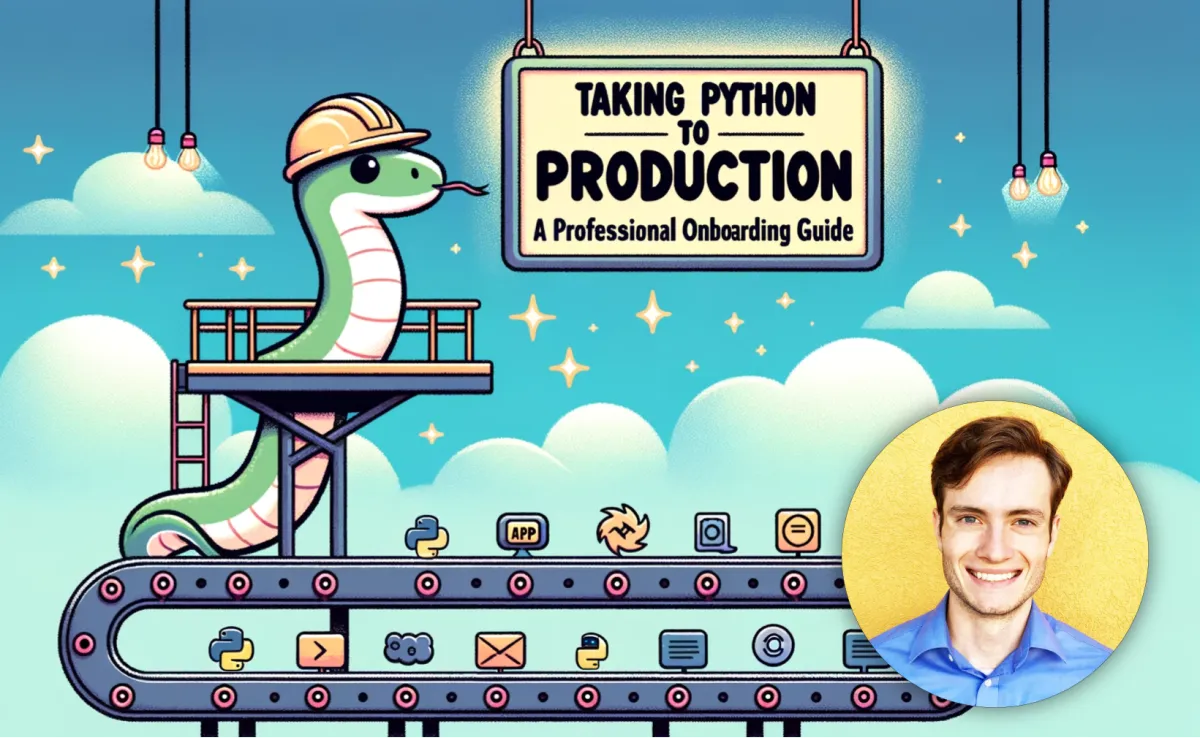
See you in Discord!
FAQs
Is there a refund policy?
TL;DR: Yes. You can request a refund no questions asked.
within 2 weeks from the start of a cohort
or if you have watched <40% of the videos in the self-paced delivery format
We've issued 2 refunds so far. The reason was the students underestimating the pace of the bootcamp (9-15 hrs/week).
Many applicants do not have a strong background in the software engineering concepts assumed by the course material. (Usual culprits in order: pytest, Python packaging, venv management, VS Code for Python)
For these, I recommend the mostly free Taking Python to Production course and offer a $100 discount on this one if you complete it. Learn more here. This helps you upskill and decide if you really like me enough as an instructor to enroll in this higher-priced course.
I've seen Taking Python to Production make a huge career difference for folks that do not come from a traditional SWE background.
Are scholarships or discounts available?
Yes.
You can get a $100 discount if you complete Taking Python to Production, including the final course project. I offer this because taking this course de-risks the course two ways: you know you like me as an instructor; I know you are well-prepared with the foundational SWE knowledge assumed by the course material.
If you need more: There is a portion of the application to explain your situation and apply for a needs-based scholarship. These are generally meant for people who have been laid off or are struggling to get a job.
Is there a referral program?
Yes! I (Eric) am a small creator, so the primary way for to teaching to be sustainable is by word-of-mouth referrals.
Shoutouts from Students
Click images to view the original posts
Casey Wahl
MLE @ Progressive Leasing
I came into this Python Cloud Engineering course with 6 years of industry experience including over 3 years as an MLE.
I expected about 50% of the content to be incrementally useful, but Eric’s course had such depth that it exceeded my expectations and in reality was about 90%.
The abundance of best practices I’ve learned in this course have been transformative!
Why waste years searching for these best practices on your own when Eric has masterfully curated content that nourishes a coder’s soul?
Copyrights 2024 | MLOps Club, L.L.C. | Terms and Conditions

